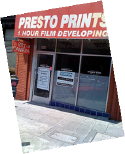
|
|||||||||||||||||||||||||||||||||||||||||||||||||||||
|
Over the weekend I started a new site with my longtime friend and fellow Berkeleyite, Lance Knobel. The site arose out of a dozen conversations with friends and neighbors. "Does Berkeley have a site that's just about Berkeley?" The answer, always: "I wish there was one." Lately the conversations have been more urgent. Why don't we get off our butts and start one already. So we did. We all agree, we hope, that Berkeley is a great place, but it means different things to everyone who lives here. To some it's a great university town. To others it's a place to live, or a place to work. To others it's a cultural center. There's a huge freeway that passes through town, and a train line that goes to Chicago, New Orleans, New York, Seattle, Canada, probably everywhere else in the country. We have poverty and wealth. A new shopping district and an old one. Manufacturing, a winery, car dealers, biotech and computer firms. Some of the best public transit in the world. We have artists, scientists, great thinkers, journalists, many of the smartest people on the planet are our neighbors. We voted for Obama but we saw some McCain signs on front lawns. We have strong opinions, but we also value tolerance.
I tried living on the road, but I needed a permanent place to sleep, write, and a consistent set of friends to hang with day in and day out. I could have had that in a variety of places but I chose Berkeley because it's beautiful, the politics are a good match (not in the cliche sense that rightwingers think) and the people who live here are intelligent, friendly, not pretentious and they don't work too hard, as a rule, so they have time to play. Tom Hunt, a longtime Berkeley resident said it well. If you take out the university, Berkeley is a small place. The day he said it I ran into three people on the street who I knew on my daily walk. But over time I've given it thought and realize that it's not a small place, but it feels that way, it's approachable. Now there are things not to like about Berkeley. And I suppose each of us has our own list. For me, it's the black hole that downtown is. I don't like going there. I don't understand why a great city like Berkeley doesn't have a thriving and bustling downtown. With the great public transit and the world-class university, located in the middle of one of the most dynamic metropolitan areas of the world, why isn't the downtown a place more people want to come to, not just from within Berkeley but from all around the Bay Area, the state, the country, the world? To me, having lived here only three years, most of what I know about Berkeley is how much I don't know about Berkeley. But having a blank page to fill in is one of my favorite things. With my good buddy Lance, and hopefully with a lot of help from friends in and around this great place, I hope InBerkeley.com will become a place to learn and share and grow a greater Berkeley.
Like a lot of other developers I'm hooked on Amazon. It started with their storage system, S3. Now I use EC2, and hope to find an application for SimpleBase. I'm using many of the other smaller features of their cloud. It's great stuff. However, there are a couple of components I'd like to see added to Amazon's cloud. 1. Internet-level notification. I'd really like them to offer the basic notification facilities of Twitter. See this piece that says that like it or not Twitter is becoming an essential part of the infrastructure. It's true. We need them to have competition, and it should come from Amazon, and many other places. 2. URL-shorteners. They're a fact of life. But I should have my own shortener at my own domain, so I control the future of the URLs. That way if the service I use should go down, I could switch to another. I also want to generate stats from the URLS. Bit.ly was supposed to do #2. My plan for the developers went like this. When you have a question how to do something, do it the way Amazon does it. I want the API to be like theirs, the docs, and most important -- the pricing. If Amazon did a URL-shortener, they would charge by the URL, and they would charge for each access. The prices would be very low, but they would add up. The same way they do it for S3 and EC2. Bit.ly was to be the URL-shortener that Amazon would have made. Now today I learned of two URL-shorteners that are offering to host domains for you. One charges a flat rate of $49 per year and is available today. Another promises to do it for free, but it's available soon. Watch this area closely, it's important. Help I'm trapped inside the Tumblr API There's something I'm not getting here. A few weeks ago I tried to get a very simple script working with the Tumblr API. I kept getting a return value that said the API was down. I waited and waited for it to come back up before finally throwing my hands up in frustration. I tried everything I could think of. Turns out this was an error in the proxy server, the API was still up. Tried some more still couldn't get it to work. Today I started fresh. Got the same result. Here's the URL that I'm POSTing to. (The password is xxx'd out.) Here's the response I get. I really would like to get past this, so if anyone has working code could you check to see what I'm doing wrong. TIA. Update: Finally got it working. The params had to be in the body of the HTTP request, and I had the wrong content type on the request. Their messages could use improvement, they sent me down the wrong path, and a page with some examples would also have saved time and embarassment (I don't mind the embarassment, but I do mind losing all that time.) 3 Twitter apps you can't live without?
Examples of Web 2.0 services I can't live without: Flickr, GMail, Twitter, Kayak, (though it pains me to say this) TechMeme, FriendFeed, Mininova, Amazon. I'm sure I'll think of others. But that's about Web 2.0, today I'm asking a different question. Are there any Twitter apps that you couldn't live without? If so, what are they? I'm fairly sure most of the apps will be clients, tools that read and post to Twitter from the desktop that in some way work around a limit of the Twitter web app. Tweetie is very popular. Seesmic, TweetDeck, the curiously named Destroy Twitter. What are the others? |
"The protoblogger." - NY Times.
"The father of modern-day content distribution." - PC World.
One of BusinessWeek's 25 Most Influential People on the Web. "Helped popularize blogging, podcasting and RSS." - Time.
"The father of blogging and RSS." - BBC.
"RSS was born in 1997 out of the confluence of Dave Winer's 'Really Simple Syndication' technology, used to push out blog updates, and Netscape's 'Rich Site Summary', which allowed users to create custom Netscape home pages with regularly updated data flows." - Tim O'Reilly.
My most recent trivia on Twitter. On This Day In: 2008 2007 2006 2005 2004 2003 2002 2001 2000 1999 1998 1997. |
||||||||||||||||||||||||||||||||||||||||||||||||||||
|
© Copyright 1997-2009 Dave Winer. Previous / Next |
|||||||||||||||||||||||||||||||||||||||||||||||||||||


 TechCrunch used to do an annual list of Web 2.0 services they couldn't live without. The list wasn't about which apps are cool, but which ones are so useful that you build your online life around them. Products that becomes mainstays, apps you use all the time, tools that would cause panic if they went away.
TechCrunch used to do an annual list of Web 2.0 services they couldn't live without. The list wasn't about which apps are cool, but which ones are so useful that you build your online life around them. Products that becomes mainstays, apps you use all the time, tools that would cause panic if they went away.

